Rubber Tree Plantations in Xishuangbanna
As soon as I left Da Sha Ba, Yinshi Qi and Wu Kai, I hopped on a bus towards Jinghong- the capital of the Xishuangbanna Dai Autonomous Prefecture. Xishuangbanna shares borders with Laos and Burma and his home to 27 ethnic minorities including the Dai, the Hakka, the Hani, the Bulan. Because of its unique location at the meeting point of temperate and tropical climates, Xishuangbanna has an extremely diverse flora and fauna. After being in the mountains close to Tibet, Xishuangbanna felt so irreal with its heat, humidity and tropical forest.
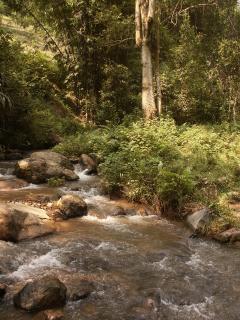
The forest in Xishuangbanna
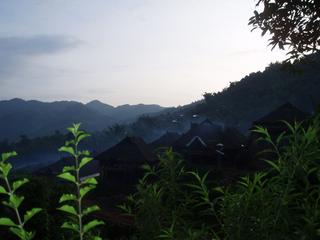
A Bulan village at dawn
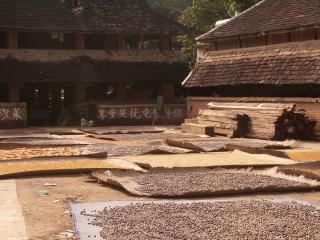 Drying rubber seeds and rice in a Dai village.
Drying rubber seeds and rice in a Dai village. In Jinghong I visited the Tianzi Biodiversity Research and Development Center lead by a German ecologist, Josef. Josef runs the center with his Chinese wife, Minguo. I initially contacted them because their website mentioned that they were making essential oils from plants native to Xishuangbanna. In fact the essential oils are just a small part of their research. But on a Friday morning, I show up at the Center, which turned out to be Josef and Minguo's home. We chatted for a while about their research and about my project. This conversation went pretty well as later this afternoon, they offered me to take my stuff from the hostel in Jinghong so that I could stay with them for a while. During my stay with them, I learned a lot, mainly about the rubber industry and its negative effects on the tropical forest in Xishuangbanna but also about sustainable agriculture. I took the opportunity to question my project and in the end decided to slightly change its directive line.
Life in the Chinese countryside is tough. Now that people need cash money to buy clothes and other commodities, farmers can no longer rely on a subsistence-style of farming, where farmers could survive solely from the crops they grew. To address this problem, the government provided the farmers with a very attractive solution: rubber. Once the rubber is planted, the sap can be collected once the trees are 7 years old and every year for 30-40 years. We calculated that every year, depending on the size of the farmer's allocated land, the rubber harvest represents an income of over 1,000 Euros and may reach 3,000 Euros. This is a lot and up until now is the most lucrative source of income for the farmers in Xishuangbanna.
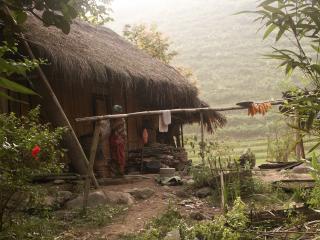 A house in the rice fields
A house in the rice fields 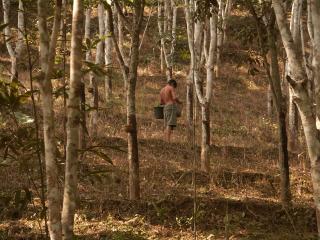 A teenager collecting the rubber sap
A teenager collecting the rubber sap
However, rubber poses a number of ecological problems. In order to plant the seedlings, thousands of hectares of rainforest are decimated and replaced by monocultures of rubber trees. Furthermore, rubber sap is toxic for a number of insects and plants, and so the rubber plantations are a serious threat to the biodiversity of the Xishuangbanna rainforest. So the researcher's idea is to find new economic uses for native species: using banana flowers as ornamental plants or selling essential oils of rare plant species... Then the production of a variety of plants could potentially be as lucrative as rubber, and a mini forest composed of these diverse species could replace the monocultures, hence increasing the biodiversity.

The forest (right upper corner) is threatened by deforestation
During my stay with Josef and Minguo, we went on many trips to the forest, smelling different plants. We tried to distill the leaves of a very peculiar ginger- but the yield was extremely low.... We also visited local villages that had been producing ylang ylang oil, the botanical garden, the tropical plants institute...
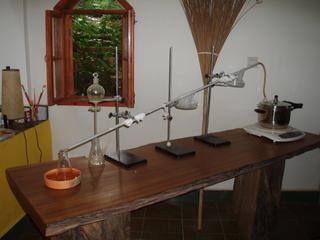
The distillation apparatus we built from what we could find to extract the oil from the rare ginger species
I ended up staying with Josef and Minguo much longer than what I had originally planned. It was hard to leave this homely and conducive-to-learning environment... but I have to move on, and so I left, a few days before the Chinese National Day, October 1st.
A collection of pictures from the forest:
 We took the picture VERY quietly...
We took the picture VERY quietly... 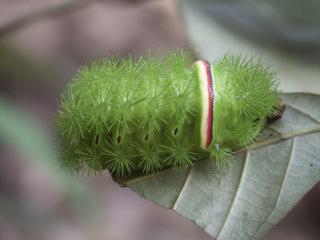 What I call a "bubble gum" caterpillar.
What I call a "bubble gum" caterpillar. Another weird guy.
Another weird guy. I almost walked in its web... ahhh...
I almost walked in its web... ahhh... A rare orchid species. Josef, who collects them to cross them, was in heaven.
A rare orchid species. Josef, who collects them to cross them, was in heaven.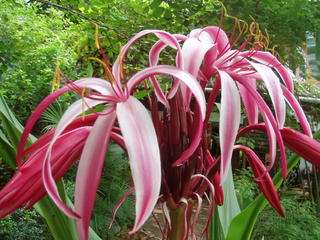 A very fragrant flower from Josef and Minguo's tropical garden.
A very fragrant flower from Josef and Minguo's tropical garden. 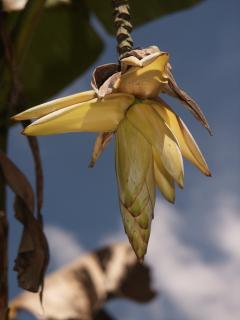 A banana flower from the Xishuangbanna Tropical Botanical Garden.
A banana flower from the Xishuangbanna Tropical Botanical Garden.

0 Comments:
Post a Comment
<< Home